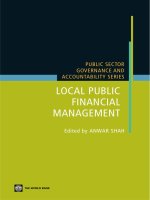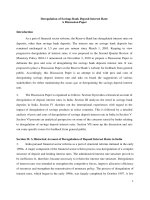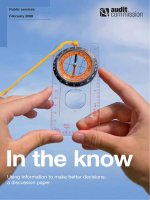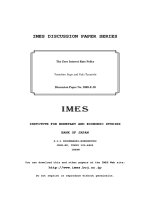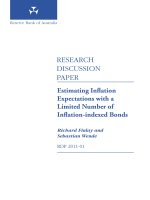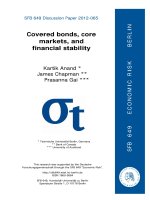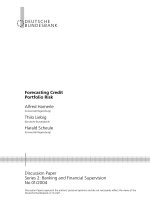Local Government Financial Audits Discussion Paper August 2007_part2 pot
Bạn đang xem bản rút gọn của tài liệu. Xem và tải ngay bản đầy đủ của tài liệu tại đây (69.97 KB, 10 trang )
DME 34279
11
4. Summary
The Local Government (Financial Management) Regulations 1999 reflect a non prescriptive policy and
discretion for self management of accounting polices and procedures for Local Government.
The LGA in partnership with the Minister for State/Local Government Relations has worked
extensively to enhance the financial governance and financial management framework of Local
Government. This has included:
• further changes to the Local Government Act;
• the Independent Inquiry;
• development of information papers and audit specifications;
• development of financial indicators and codes of practice; and
• financial sustainability standards.
While these enhancements have significantly improved the audit framework within Councils there is
scope to further improve the consistency and comparability of accounting policies across the sector.
The “Strengthening Local Government Program” suggestion that:
1. administrative accountability of Councils financial activities could be strengthened through
provision for the Auditor-General to conduct “sample” audit assessments of Council audited
financial statements, on an annual (or bi-annual basis), and
2. the Auditor-General to provide advice regarding the outcomes of these assessments to the
Minister for State/Local Government Relations and the LGA
should be considered in light of other options included in this paper and feedback received from the
State Government, Councils and other stakeholders.
DME 34279
12
APPENDIX A
Financial and Administrative Accountability Report 2005 – Recommendations
Source: “The SA Local Government System: Administrative and Financial Accountability Structures – Report from a joint project of the SA
Office of State/Local Government Relations and the Local Government Association (November 2005)
KEY EXPLANATION
ü
Recommendations that have been implemented
*
Recommendations under development
#
Recommendations not currently addressed
RECOMMENDATIONS
STATUS
Recommendation 1
That early attention be given to developing a Local Government Finance
Standard to support good financial management and improved financial and
compliance audit in Councils. Development of the Standard should be
informed by the Financial Sustainability Review Board’s recommendations on
key financial indicators and standardised local government accounting
policies. The Standard should acknowledge Councils of widely varying
resources, should be required to be adopted consistently throughout the
sector, and should be accompanied by comprehensive training opportunities
for Councillors, chief executive officers, financial managers, and local
government auditors.
*
Recommendation 2
That implementation of the Financial Sustainability Review Board’s
recommendations for development of key financial indicators and accounting
policies across the local government sector, as well as of a model
specification for a Council audit, be strongly supported, and proceed in
conjunction with development of the Local Government Finance Standard
referred above.
ü
Recommendation 3 That consideration also be given to incorporating development of a “Uniform
Reporting Code of Practice” (as recommended by the Financial Sustainability
Review Board) into the proposed Local Government Finance Standard.
*
Recommendation 4
That the Local Government Association (LGA) consider brokering cooperation
arrangements enabling lower resource Councils to share human resources for
internal audit with each other or with mentor higher resource Councils.
*
Recommendation 5
That Councils include skilled members external to the elected membership on
their Audit Committees and that this recommendation be included in the
forthcoming Code of Financial Practice. The Council’s principal member
should not chair the Audit Committee. A Council’s employees should not be
excluded from appointment to the Audit Committee of another Council.
ü
DME 34279
13
Recommendation 6
That the proposed Local Government Finance Standard’s treatment of a
model audit specification (see 2 above) include assessment of the minimum
amount of time that an auditor can be expected to take on each component,
with variations for size of Council.
ü
Recommendation 7
That the LGA consider establishing a list of preferred suppliers of Council
audit services in conjunction with the Local Government Financial Managers
Group, on the basis of qualifications, public sector experience and fees
charged, and encourage Councils to appoint auditors from the list.
#
Recommendation 8
That the Auditor-General should not be given the task of auditing Council’s
annual fi nancial statement at this time, but that when the regulatory regime
outlined earlier has been fully developed, the above arrangements should be
reviewed, and further consideration be given to the need for a possible
statutory mechanism (either the Auditor-General or another) for appointment
of auditors to Councils.
#
Recommendation 9
That the LGA include in training opportunities offered to all participants in the
local government sector programs that make clear the role of audit of all kinds
in improving management practices.
ü
Recommendation 10
That the LGA initiate a pilot program of volunteer Councils that may be willing
to demonstrate good practice in undertaking efficiency and economy audits of
specified Council programs. Reports from these pilots should be made readily
available to other Councils and, based on the pilot experience, an ongoing
program be developed.
#
Recommendation 11
That a similar program be undertaken in which selected volunteer Councils
demonstrate evaluations of the effectiveness with which specific programs
contribute to achievement of Council objectives and how the resultant
information can be used for improvement.
#
DME 34279
14
APPENDIX B
Local Government Financial Management Framework
Management Framework
SA LOCAL
GOVERNMENT
Policy
Development
Corporate
Planning
Service &
Resource
Allocation
Planning
Business
Planning
Service
Delivery
Reporting
Performance
Evaluation
Control
ü ü
ü ü
ü
ü
ü
Transaction
Processing
ü
ü
ü
Asset & Liability
Management
ü ü
ü ü
ü
ü
ü
Reporting
ü ü
ü ü
ü
ü
ü
Financial Management Components
Planning &
Analysis
ü ü
ü ü
ü
ü
ü
Management Framework
STATE
3
GOVERNMENT
Policy
Development
Corporate
Planning
Service &
Resource
Allocation
Planning
Business
Planning
Service
Delivery
Reporting
Performance
Evaluation
Control
ü ü
ü ü
ü
ü
ü
Transaction
Processing
ü
Asset & Liability
Management
ü ü
ü
ü
Reporting
ü
ü
ü
Financial Management Components
Planning &
Analysis
ü ü
ü ü
ü
ü
ü
3
The many relationships between the different elements of the two frameworks show how important the Financial
Management Framework is to an efficient and effective general management framework in the public sector
SA Government Financial Management Framework , Dept Treasury and Finance Updated 24 April 2002
DME 34279
15
APPENDIX C
Report of the Independent Inquiry into the Financial Sustainability of Local Government
– 5 Audit Recommendations
Recommendation 1 – That each Council undertakes all internal financial reporting of its planned
and actual financial performance and position in a format and on a basis that is fully consistent
with the external financial reporting standards and codes applying to the Council.
Recommendation 2 – That each Council establishes an audit committee that has external
membership and does not include the Council’s mayor as chair or it’s CEO as a member.
Recommendation 3 – That Councils adopt as one of the functions assigned to the audit
committee the review of the effectiveness of:
(a) The Council’s financial governance arrangements, and
(b) The Council’s planning and monitoring processes in ensuring the sustainability
of the Council’s long-term finances.
Recommendation 4 – That country Councils or smaller Councils give consideration to
establishing regional or joint audit committees aimed at pooling scarce resources and increasing
the level of expertise available to individual Councils.
Recommendation 5 – That the LGA develops and publishes guidance for Councils in the conduct
of what some have termed “economy and efficiency audits”, being reviews aimed at assessing the
effectiveness of a range of governance and management arrangements, including a Council’s
policies and practices relating to financial governance.
1
Source: “Rising to the Challenge – Towards Financial Sustainable Local Government in South Australia” (August 2005 at page 18).
DME 34279
16
APPENDIX D
Sample Costs for SA Councils External Audit
The table below illustrates some sample costs for SA Councils and selected States in relation to external audit
1
.
South Australian Council Auditor Fees
Council Budget Range 2005 2006
Adelaide Hills $25m - $30 m $10,300
Alexandrina Council $25m - $30m $8,100 $8,625
The Barossa Council $15m - $20m $7,580 $7,955
Campbelltown City $25m - $30m $11,400 $12,000
Ceduna <$10m $6,470 $7,300
Coorong <$10m $7,433 $7,545
Elliston <$10m $6,670 $7,430
Le Hunte <$10m $5,290 $6,480
Victorian Council Auditor Fees
Council Budget Range 2005 2006
South Grampians $25m - $30m $25,000 $25,000
Alpine Shire $15m - $20m $22,000 $39,000
Swan Hill $30m - $35m $28,150 $43,850
Buloke $15m - $20m $24,000 $26,000
Tasmanian Council Auditor Fees
Council Budget Range 2005 2006
Brighton $10m -$15m $12,230 $18,495
Kentish <$10m $13,000 $13,000
George Town <$10m $14,457 $12,500
Circular Head $10m -$15m $14,440 $16,339
Flinders <$10m $10,160 $14,040
West Coast <$10m $14,000 $16,000
1
Source: 2005/06 Annual Financial Statements derived from Council Websites, where external audit fees could be separately identified.
DME 34279
17
APPENDIX E
Comparison Table between Local Government Act 1999 and
Public Finance and Audit Act 1987
Issue
Local Government Act 1999 / Local Government (Financial Management)
Regulations 1999
Public Finance and Audit Act 1987
Financial
statements
audit
Section 128
A Council is required to have a registered company auditor, appointed by the
Council’s Audit Committee. The auditor cannot be a Council member or potential
member, and must be rotated on a five-year basis. A Council must provide details in
its annual report of all remuneration and benefits received by its auditor, together with
any reasons for ceasing an auditor’s term of office.( A copy of the Councils annual
report must be provided to Parliament)
Section 129
The auditor must perform an annual audit of the Council’s financial statements and
prepare a report meeting the minimum criteria set out in the section.
Sections 31-32
Auditor-General must audit financial statements of public authorities , each
financial year.
Auditor-General may examine financial statements of a public authority if
directed by the Treasurer. Auditor-General must prepare a report setting
out the results of the examination, and provide copies to the Treasurer
among others.
No requirements for rotation of auditor.
ANALYSIS & COMMENT:
Under the Local Government Act (“LG Act”), an auditor must be appointed by the Council’s Audit Committee, whereas under the Public Finance and Audit Act (“PFA Act”) the Auditor-
General conducts the audits.
An auditor under the LG Act is required to be rotated every 5 years, whereas there is no requirement for rotation of an auditor under the PFA Act.
Both Acts require the auditor to provide a report setting out a variety of information as required in either Act
Council must provide in its annual report details of auditor’s remuneration under LG Act, no similar requirement for public authorities under the PFA Act.
Issue
Local Government Act 1999 / Local Government (Financial Management)
Regulations 1999
Public Finance and Audit Act 1987
Efficiency
and
Economy
audits &
other
examination
Section 130A
A Council may request that its auditor undertake an examination of its financial
management, or the efficiency and economy with which it manages its resources,
that would not ordinarily be addressed or included as part of the annual audit. A
report on the examination must be provided to the Principal Member of Council, who
must provide copies to the CEO, other Council Members, and the Council’s audit
committee. The report must be placed on the agenda at the next Council meeting for
consideration. The report must be kept confidential until such Council meeting.
Sections 31-32
Auditor-General may examine the efficiency and economy with which a
public body uses its resources , or in relation to whether a publicly funded
project is efficient and cost effective.
A report is to be delivered to the Treasurer and to the president of the
Legislative Council and the Speaker of the House of Assembly
ANALYSIS & COMMENT:
Both the PFA Act and the LG Act indicate that efficiency and economy audits may be made in relation to how a Council / public authority uses its resources.
The LG Act provides for the report to be provided to the presiding member and placed on the agenda of the next Council meeting, whereas under the PFA Act the report is to be delivered
to the Treasurer and to the president of the Legislative Council and the Speaker of the House of Assembly. Both Acts ensure that the result of any efficiency and economy audit is made
public.
The PFA Act provides for the audit of the efficiency and economy of publicly funded projects as well as bodies, where as the LG Act is silent on provision for audits of individual projects.
This is trial version
www.adultpdf.com
DME 34279
18
Issue
Local Government Act 1999 / Local Government (Financial Management)
Regulations 1999
Public Finance and Audit Act 1987
Relevant
standards
Regulation 14
An audit must be carried out in accordance with the Auditing Standards and Auditing
Guidance Statements published by the Australian Auditing and Assurance Standards
Board.
Auditor-General’s Department applies the Auditing Standards and Auditing
Guidance Statements published by the Australian Auditing and Assurance
Standards Board.
ANALYSIS & COMMENT:
LGA Act requires audits to be carried out in accordance with the Auditing Standards, whereas there is no legislative requirement under the PFA Act.
However, discretion is retained by the Auditor-General.
Issue
Local Government Act 1999 / Local Government (Financial Management)
Regulations 1999
Public Finance and Audit Act 1987
Auditor’s
power to
obtain
information
Section 130
An auditor may compel the Council’s chief executive officer to produce accounts,
accounting records and other documents relating to financial or internal controls, or
any other matter being examined, together with any explanations. The maximum
penalty for breach is $10,000.
Section 34
Auditor-General possesses wide powers to compel production of
information including issuing summons, requiring appearance of persons,
or the production of documents. May requir e a person to appear before
him/her to make an oath or affirmation to answer truthfully all questions
relating to audit or examination. The maximum penalty for breach is $5000,
or 3 months imprisonment.
ANALYSIS & COMMENT:
Under the PFA Act, the Auditor-General has wide powers to compel the appearance and evidence on oath of persons, as opposed to the LG Act which provides for documents to be
produced together with explanations.
Under the LG Act the maximum penalty is $10,000, whereas under the PFA Act the penalty for breach is only $5000 or 3 months imprisonment. The penalty imposed under the LG Act for
a breach to provide information required as part of an audit is double that of the PFA Act, although the PFA Act imposes wider powers of production and appearance on the Auditor-
General.
Issue
Local Government Act 1999 / Local Government (Financial Management)
Regulations 1999
Public Finance and Audit Act 1987
Indepen-
dence of
Auditor
Section 128(8)
Regulation 16A
A council must not engage auditor to perform any services outside scope of auditor’s
functions under the Act.
Chief executive officer, presiding member of audit committee and auditor must certify
the independence of auditor on annual basis.
Part 3
Sections 26(1), 29
Auditor-General may only perform those functions prescribed under Part 3
– ie financial statements audit and efficiency and economy examinations,
otherwise may be suspended from office.
Auditor-General must not engage in any other employment/business
without consent from Governor.
Auditor-General must make a declaration before Executive Council to act
impartially in carrying out his/her functions.
ANALYSIS & COMMENT:
Both Acts require the auditor to carry out functions independently and not whilst engaged in any other employment/business.
This is trial version
www.adultpdf.com
DME 34279
19
Issue
Local Government Act 1999 / Local Government (Financial Management)
Regulations 1999
Public Finance and Audit Act 1987
Reporting
requirement
Section 129
The auditor must report any irregularities which have not been rectified by the
Council within a reasonable time, any major breaches of the Act to the Minister, or
any major financial irregularity (not minor irregularities or breaches). An investigator,
or the Auditor-General may be appointed to investigate any irregularity or breach.
Sections 36-37
Auditor-General must prepare annual report to be tabled to Parliament
stating whether, in his/her opinion, financial statements of each public
authority accurately reflects the financial transactions of the authority, and
whether internal financial controls are sufficient. Report must include any
other matters that Auditor-General considers should be brought to attention
of Parliament.
Auditor-General must provide copies of the report to the Treasurer,
responsible Minister and Parliament any matter he/she considers to require
action, and to make recommendations where in the opinion of the Auditor-
General action is necessary or desirable in the public interest.
ANALYSIS & COMMENT:
The LG Act has provision for the Auditor-General where requested by the Minister to investigate any major irregularity or breach occurs.
PFA Act gives Auditor-General more scope for reporting” any other matters” that in their opinion should be brought to the attention of parliament, whereas the LG Act refers to the reporting
of breaches and irregularities that are “not minor”.
The LG Act provides for only significant breaches to be reported (breaches that are “not minor”), whereas the PFA Act has scope for both minor and significant breaches to be reported if in
the Auditor-General’s opinion they should be brought to the attention of parliament and is in the public interest. Hence a greater amount of subjectivity of the auditor is allowed for under the
PFA Act. This may capture situations, for example, where there are recurrent minor breaches.
Issue
Local Government Act 1999 / Local Government (Financial Management)
Regulations 1999
Public Finance and Audit Act 1987
Fees
A council is free to negotiate auditor’s fees according to council’s ordinary contracting
policies.
Section 39
Auditor-General is entitled to charge a fixed fee with approval from
Treasurer.
ANALYSIS & COMMENT:
There is no specific provision under the LG Act or Regs regarding charging a fixed fee for audit.
This is trial version
www.adultpdf.com
DME 34279
20
APPENDIX F – Local Government Audit Framework - Flowcharts
Appendix F1 – Current Local Government Audit Framework
SA Parliament
Council’s Annual
Reports
Minister
Irregularity
Breach of Act
Investigation
May be Auditor
General
Council
s
Financial Sustainability
Indicators;
Whistle Blowing Protection
Act;
LG Act:
Annual Plan;
Strategic Management Plans;
Financial Management Plans;
Asset Management Plans;
Financial
Policies/procedures;
Internal controls;
Financial Statements;
Economy& Efficiency Audits;
Review external audit report
(LG Act requirement)
Ombudsman
Review of
Administrative
practices
(under LG Act);
FOI
External Audit
Local Government
Act;
Local Government
(Financial
Management) Regs;
Audit Standards;
Accounting
Standards;
SA Records
Management Act;
Internal Controls;
Policies/procedures/
practices
Audit Committee
Review External Auditor’s Report;
Whistle Blowing Protection Act;
Economy and Efficiency Audits;
Financial polices/procedures/
practices;
Recommendation to Council in
recruitment of Auditor
Communities
Annual Report;
Financial Statements;
Open Meetings;
Consultation on
Annual Plan;
Strategic Plans;
Financial Management
Plans;
Asset Management
Plans;
SA Anti-Corruption
Branch;
Criminal Law
Consolidation Act
